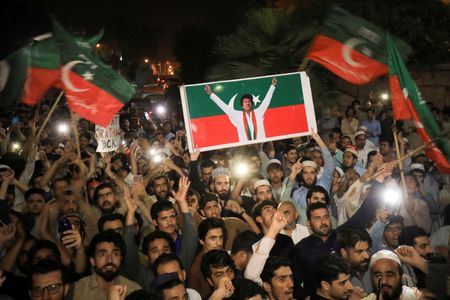
Pakistan in Endless Churn
 Fri, 22 Jul 2022
| Reading Time: 5 minutes
Fri, 22 Jul 2022
| Reading Time: 5 minutes

During the dying days of the government of Pakistan’s former Prime Minister Imran Khan, he continued to insist on his own popularity. As he struggled to survive against the combined opposition, everyone disbelieved him except a few. The latter were those who were correctly reading the radicalization of Pakistani society, a phenomenon which had never resulted in a victory for the radicals at the polls. However, they were also pointing out how things were beginning to change on the political front. The constant badgering about religion, using ideology to run every political agenda, giving greater substance to blasphemy laws and attempting to hold the streets to ransom in the name of faith, without too much of a whimper from the elites and the government, was giving Imran Khan a higher degree of confidence.
Three months after his government fell the first signs of Imran Khan’s claim appear to have been vindicated in the form of the state assembly by-elections in West Punjab where his Pakistan Tehreek e Insaf (PTI) party has romped home with a better than majority result in the by-election. Of the 20 seats which went to the polls 16 went to PTI.
It could not have come at a worse time for Pakistan. The Nine Party alliance which is in power after ousting Imran Khan could muster only three seats. Imran Khan’s continuous demand for advancing the General Election from Aug 2023 to anytime later this year is now going to gather greater energy. He was insistent about this even before he demitted office and has been putting street pressure on the Shahbaz Sharif government after exiting. This could manifest in even greater demonstration of street power by the PTI.
However, the first step for the Nine Party alliance led by Shahbaz Sharif’s PML (N) is to prevent the fall of the regional government of Punjab headed by Sharif’s son Humza Sharif who had been voted to power due to desertions by many of the lawmakers of the PTI just a few months ago. All those lawmakers failed to win the election again vindicating the claims of Imran Khan. The PTI holds 188 seats in the 371-seat Punjab assembly, while the PML (N) + has 179 seats. Holding Punjab is almost mandatory if the PML (N)+ wishes to go into next year’s elections on a solid footing. Punjab is Pakistan’s political, military and in many ways psychological centre of gravity but the PTI’s success should sound an ominous warning though it need not be taken entirely at face value.
Ever since the fall of Imran Khan’s government the economic condition of Pakistan has deteriorated even further. The government has been negotiating with the IMF for various tranches of the 6-billion-dollar loan. Only a part of it was paid out to Pakistan.
In early July 2022, the IMF imposed its conditions to revive that loan. These included increase in electricity tariffs and gradual imposition of Rs 50 increase in the per litre price of petrol. There are a host of other conditions which have forced the Sharif Government to go back to the National Assembly to amend various economic laws. Besides a deprecating Rupee (valued at 230 to the US dollar), high inflation and sliding foreign exchange reserves there are other negatives.
If the process of reviews by IMF continues smoothly Pakistan could get a 2-billion-dollar loan in the near future. But it’s the various economic impositions on the people that is making the Sharif Government extremely unpopular since it is doing all the footwork and taking the unpopular decisions which Imran Khan refused to take. It’s almost akin to the age-old adage – “without pain, there is no gain”. But it’s the people who have to be convinced that pain is necessary because of bad decisions of the past.
The interim period in which the responsibility of recovery is now saddled with the Sharif Government may prove an immense test for it. There is a Hobson’s choice. If it decides to go in for early elections the phenomenon just experienced at the provincial level in Punjab may play out at the national level and all the discomfort that the people are experiencing due to the IMF conditions and the flagging economy could turn to anger. A postponement does not guarantee anything except a slight chance that the international geopolitical environment may improve and so may the economies worldwide. That is a long shot because Pakistan’s basics are not right; poor infrastructure, endemic corruption, low forex reserves and most importantly poor investor confidence due to a fairly challenging internal security situation which involves sectarian tensions and an ever-increasing radical ideological footprint. If the latter is not arrested Pakistan is going to find itself a greater pariah for the world than what it has been.
The first coming of global terror, which peaked with 9/11, had many linkages with Pakistan’s ideological experiments. The world is witnessing relative quiet on that front with the Afghan Taliban also unable to settle down and the churn within the Islamic world having subsided substantially. A second coming could very well be in the making although a timeline remains relatively unpredictable. The civilisational battle predicated for Islam could well be in the making. The change that may have taken place in Pakistan since the last General Election is a likely movement towards a manifestation of radical ideology on the outcome of the election, something which was not noticed before.
Imran Khan’s insistence on a foreign hand against Pakistan (read the US hand), the very unpopular and hard measures enforced by the IMF and the continuing march of radicalism could bring greater electoral success to the radical elements. The Pakistan Army effectively battled all these elements in the kinetic realm during Operation Zarb e Azb (2014-2018) but the adage we often apply to J&K is also applicable to this situation; ‘the absence of violence is not peace’.
The Pakistan Army used hard power to curtail the ability of the terror groups to function. Today the violence has decreased quite drastically but there is no peace. That prevents the effectiveness of all counter radicalization and deradicalization programs and a tenuous peace exists. This is hardly the environment which will allow foreign investment which is one of the real means of overcoming the financial crisis. Given this situation there is every possibility of a national meltdown which can have extremely dangerous implications.
It needs to be remembered that a nation with over one hundred nuclear warheads, existing in the midst of a turbulent region, cannot be allowed to go down under. At least that is the way the Biden Administration is probably viewing Pakistan. The example of Sri Lanka is live, but it is a nation ten times smaller and many times less significant from a geo strategic angle. Recent US efforts to boost a recovery in US-Pakistan relations under the Biden Administration, is an immediate fallout of the economic situation in Pakistan which the US is probably monitoring on a regular basis. The US cannot allow its worst fears to come alive; the possibility of nuclear warheads falling into the hands of global or even local terror groups. That is the reason why there will be many efforts to take processes to the brink but ultimately a bail out of Pakistan is very much on the cards.
The one entity which has been surprisingly quiet on the entire issue has been the Pakistan Army. It did not interfere to ensure survival of Imran Khan because it realized that radicalization beyond the point already reached is likely to be fraught with danger. The last time the Pakistan Army had one-third of its frontline formations tackling radical Islamists for almost four years. It would not wish to have more of that especially when we can witness the diluting Pakistani military capability and a receding ability to play an effective role in J&K.
The Pakistan Army would like to have the LoC ceasefire remain effective and will in all probability avoid any major activities across the LoC. The effect of this on the internal situation in J&K would be very positive, giving a window to India to cement the goodwill it has been pursuing in J&K.
*****************
Disclaimer
The opinions expressed in this article are the author’s own and do not reflect the views of Chanakya Forum. All information provided in this article including timeliness, completeness, accuracy, suitability or validity of information referenced therein, is the sole responsibility of the author. www.chanakyaforum.com does not assume any responsibility for the same.
Chanakya Forum is now on . Click here to join our channel (@ChanakyaForum) and stay updated with the latest headlines and articles.
Important
We work round the clock to bring you the finest articles and updates from around the world. There is a team that works tirelessly to ensure that you have a seamless reading experience. But all this costs money. Please support us so that we keep doing what we do best. Happy Reading
Support Us





















POST COMMENTS (1)
ASHOK IYER